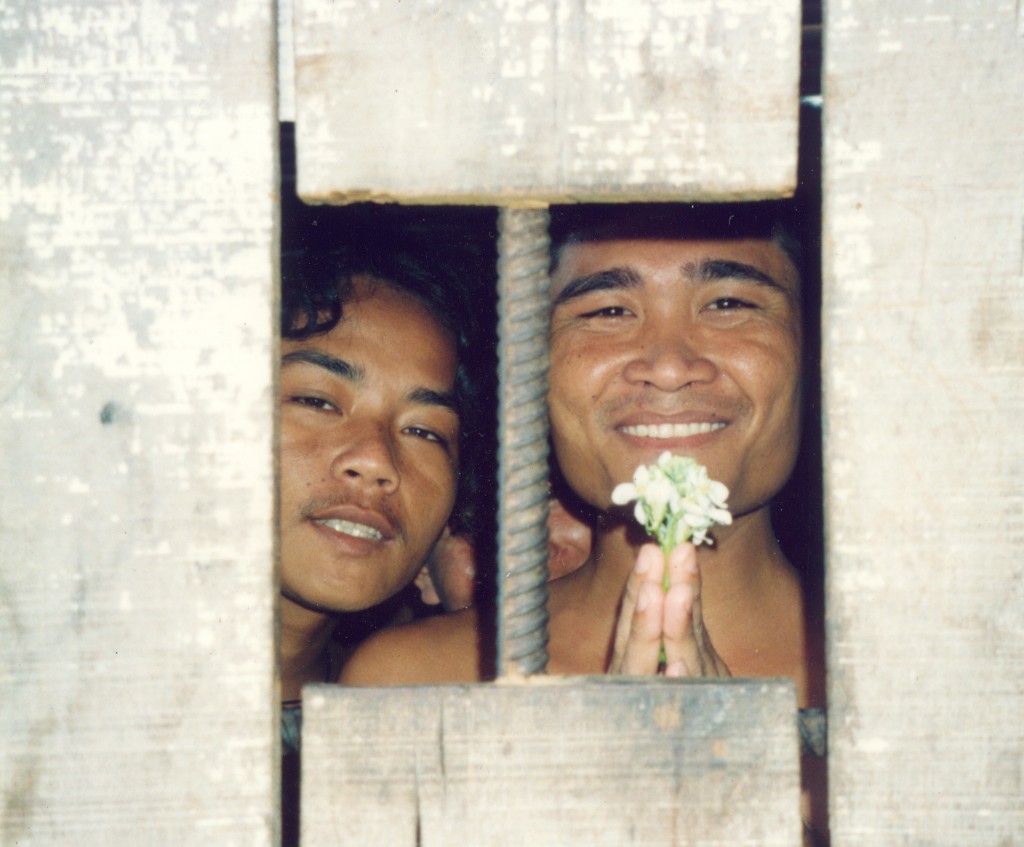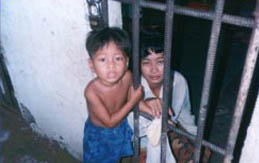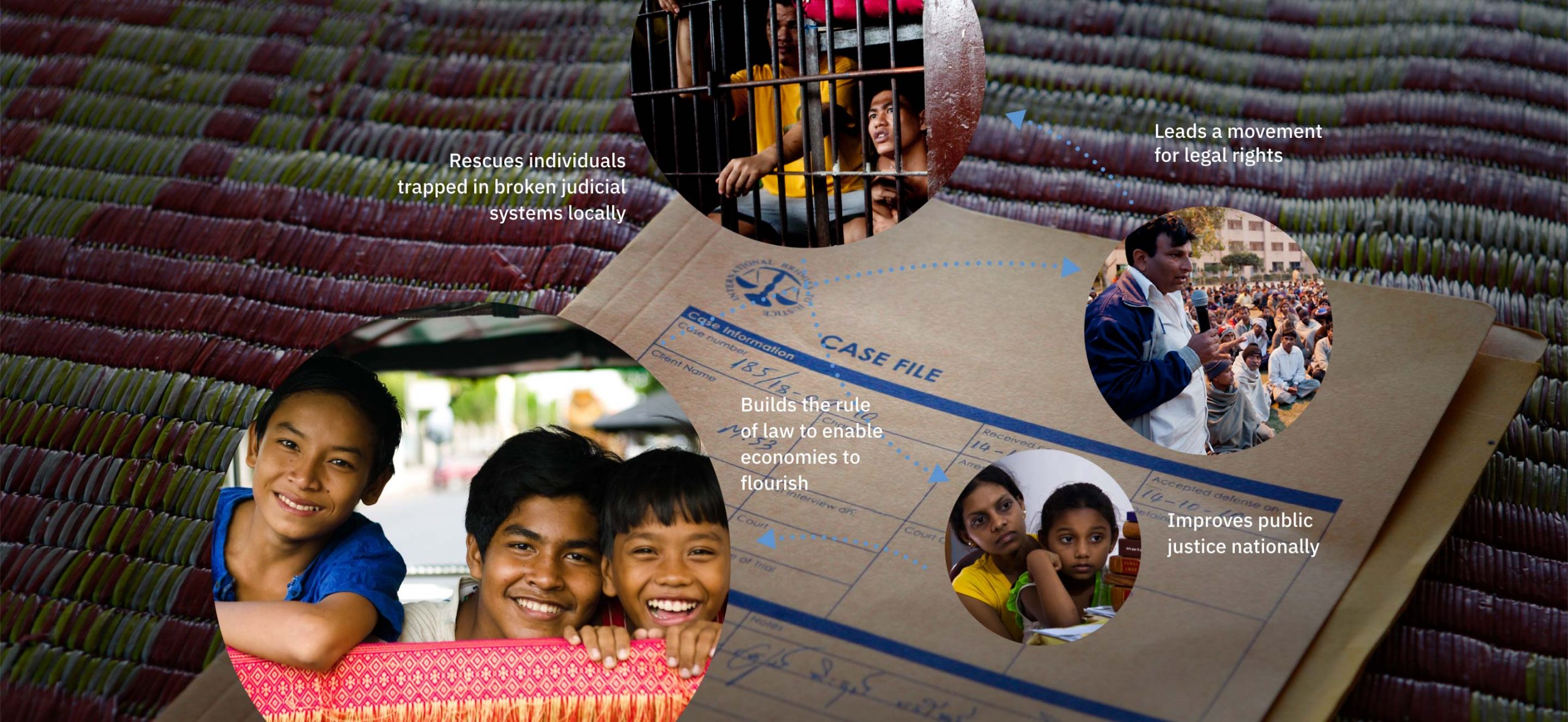TEDTalk
IBJ’s Mission
In recognition of the fundamental principles of the Universal Declaration of Human Rights, International Bridges to Justice (IBJ) is dedicated to protecting the basic legal rights of individuals in countries around the world. Specifically, IBJ works to guarantee all citizens the right to competent legal representation, the right to be protected from cruel and unusual punishment, and the right to a fair trial.
IBJ’s Vision

We envision a world where the basic legal rights of every man, woman and child are respected in case of an arrest or judicial accusation, in particular: the right to competent legal representation, the right to be free from torture and cruel treatment, and the right to a fair trial. It’s a world where the institutionalization of fair and effective justice practices have eliminated the use of torture as the cheapest method of investigation.
A world where each and every person is knowledgeable about his/her rights and is empowered to demand that they are upheld in practice.
A world where international human rights standards and relevant local laws are brought to life in the everyday practice of justice, and through the consciousness of each and every actor in the judicial system.
IBJ’s Origins
Not so long ago, as a lawyer working for the United Nations, I experienced a dramatic shift in my perceptions of approaches to international human rights and issues concerning the detained and imprisoned. I remember peering through the bars of a cell in Cambodia and talking with a young boy who had been detained, tortured by the police, and was languishing in prison, confused and daunted by what would or could happen next. Like most prisoners in Cambodia, he had no lawyer or human rights worker to defend him or safeguard his rights, and he had no pending trial date to determine his guilt or innocence. I flashed back to ten years before, to my college days of organizing letter-writing campaigns for political prisoners. We had demanded that they be free from torture and be granted their right to fair and speedy trials. But as I came face to face with this young boy, I realized that neither I nor my fellow students would have written a letter for him. He was not a political prisoner; he was just an unimportant 12 year old boy whose mischievous behavior, trying to steal a bicycle, had landed him in this quandary.

The prison guards were nice enough and did not appear too concerned that I was talking to this young boy who bore obvious signs of beating. They didn’t have much to hide: after all, use of force to extract confessions was just a part of standard police operating procedures. As I looked into the face of the boy, I felt myself wondering where we had gone wrong. I wondered why his interests, those of a “common” and “undeserving prisoner” had not made it into my “mission” statement.
Perhaps ten years ago, there might have been precious little that we could have done for this boy. Since that time, however, governments throughout Asia, including Cambodia, Vietnam, and China have passed new laws outlawing torture and providing citizens with basic rights, including their right to a defender. It was precisely because this boy was not a political prisoner, someone the government had any interest in, that he could easily have been the beneficiary of focused international attention. Citizens like him were unimportant to the government and the denial of their basic rights now had less to do with present policy and more to do with vestiges of an old legal system that formerly tolerated and even condoned this denial of rights. In his face, I recognized the thousands like him, not only in Cambodia but in countries like China and Vietnam as well, who would be the direct beneficiaries of a functioning criminal justice system with a standard of basic human rights. By helping these countries to implement their own domestic laws consistent with human rights principles and helping to safeguard prisoner rights, we had the opportunity to drastically improve and perhaps even save the lives of everyday citizens.
Vishna, a four year old boy who was born and lived in a Cambodian prison is my favorite hero. Because he was born in the prison, the guards who knew him his entire life grew quite fond of him and allowed him free range of the prison. He was small enough to climb through the bars. When I met him, though, he was getting older and could no longer get through the bottom rungs of the prison bars. But he could climb up to the third bar, which was slightly bigger, then slowly turn his head to the side and then find a way to barely pass through the bars to the other side. Everyday that I went to the prison, he would go through this process so he could run out to meet me. Then he would take my hand and go with me to each and every prison cell. At each of the 156 prison cells, he would reach his little hand or finger in to make contact with a prisoner. For most of them, he was their greatest joy.
I often think of Vishna. A boy born into a prison without material or physical comfort. But a boy who had a sense of his own heroic journey and desire to give up a piece of his life to something greater than himself. I think of the contributions he made to the prisoners’ wretched lives both on an individual level as he reached out his hand so many times, and also of the contributions he made to human rights through me – for he so often gave me strength when I was not sure why I should continue on. This heroic spirit and journey to reach behind the bars of injustice is open to all of us.
Please join Vishna in this heroic journey and let us partake in it together.
IBJ’s mission is one of hope and belief in the spirit of every human being, everywhere, regardless of circumstances.
READ “IBJ Spiritual Basis” by Karen Tse
READ “From Fear to Hope” by Karen Tse
READ “Seizing the ‘Arbitrage Opportunity” for Legal Rights” by Kenneth Neil Cukier
How do we make IBJ’s Mission a Reality?
The existence of basic defendant rights in countries around the world requires (1) a sufficient number of trained and available public defenders, criminal defense legal aid lawyers; (2) defenders to be organized in a structure and within a system which ensures that criminal defendants have access to them at the earliest legally mandated time; (3) a judicial environment which respects and embraces the role of public defenders; and (4) international support to accomplish these aims. To this end, IBJ will have three primary objectives, which are detailed below.
1. Provide direct technical support and training to emerging legal aid organizations
a) Training partnerships in the area of domestic criminal procedure and law that are in compliance with international human rights norms and standards
b) Evaluations and analysis of present criminal justice systems in relation to criminal defense, and gaps between the letter of the law and the actual practice and implementation
c) Publication of a nuts and bolts standardized manual of legal aid and criminal defense specific to the laws of each country
d) Establishment of an interactive criminal justice website to link national and international lawyers, and to host eLearning criminal defense training programs
e) Management and development support for public defender associations
f) Assistance in the development of grassroots education strategies
g) Advocacy on the role of defenders within local court, police, and government systems
2. Build International Communities of Conscience to support emerging legal aid organizations
IBJ will seek to encourage and develop individual “Bridges to Justice” communities of conscience throughout the world that will covenant to form supportive relationships with each other and bridge support to partner communities of emerging legal aid.
Presently, there are numerous volunteer resources that could be made available to defenders and legal aid lawyers abroad. Unfortunately, many of these resources are not organized and are not accessible primarily because (1) they have not been solicited and (2) those who might otherwise be willing to volunteer their services or resources find that opportunities are limited and that the barriers to volunteerism in this area are too restrictive. The IBJ volunteer program will facilitate this process by actively soliciting volunteers, outlining clear volunteer options, and providing an easy procedure for individuals and groups to donate their time and resources.
3. Advocate and support the prioritization of just and effective criminal justice systems on the agenda of organizations involved with international human rights and legal development
IBJ will work with other counterpart international organizations to strategize and develop this priority and will lobby for expansion of use of funds in this area.
IBJ will alert other aid organizations as to the needs and further development necessary in this area, and seek to encourage other organizations in their development of programs that complement and supplement IBJ’s work. For instance, IBJ will advocate and organize for further training and development of judges and prosecutors in provincial courts and for the training of local police officers.
